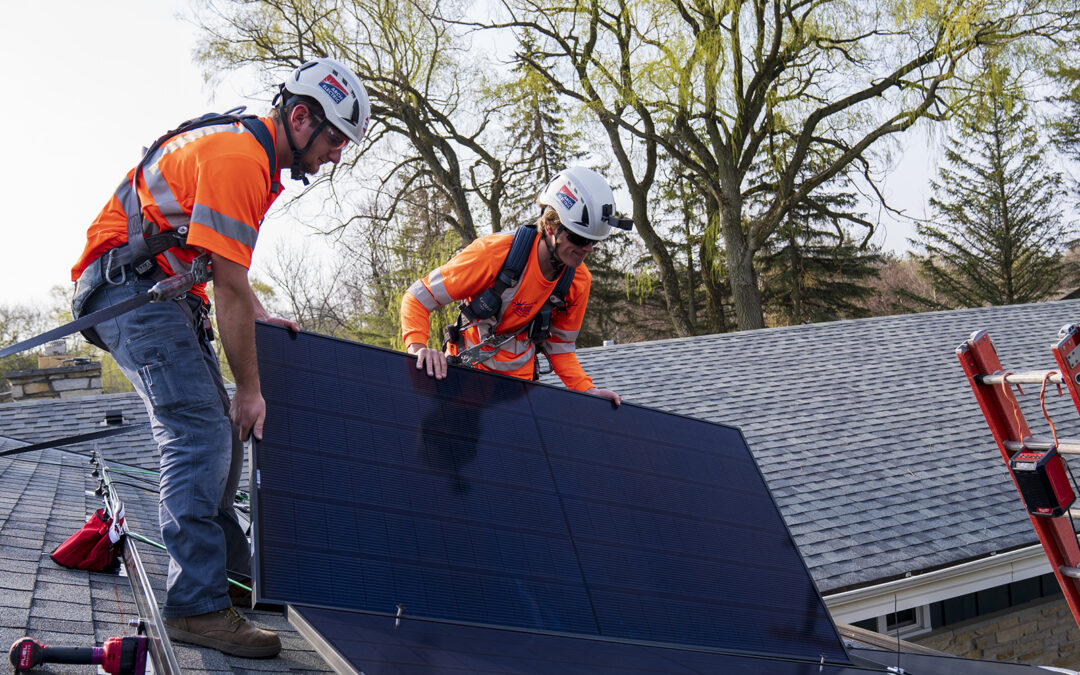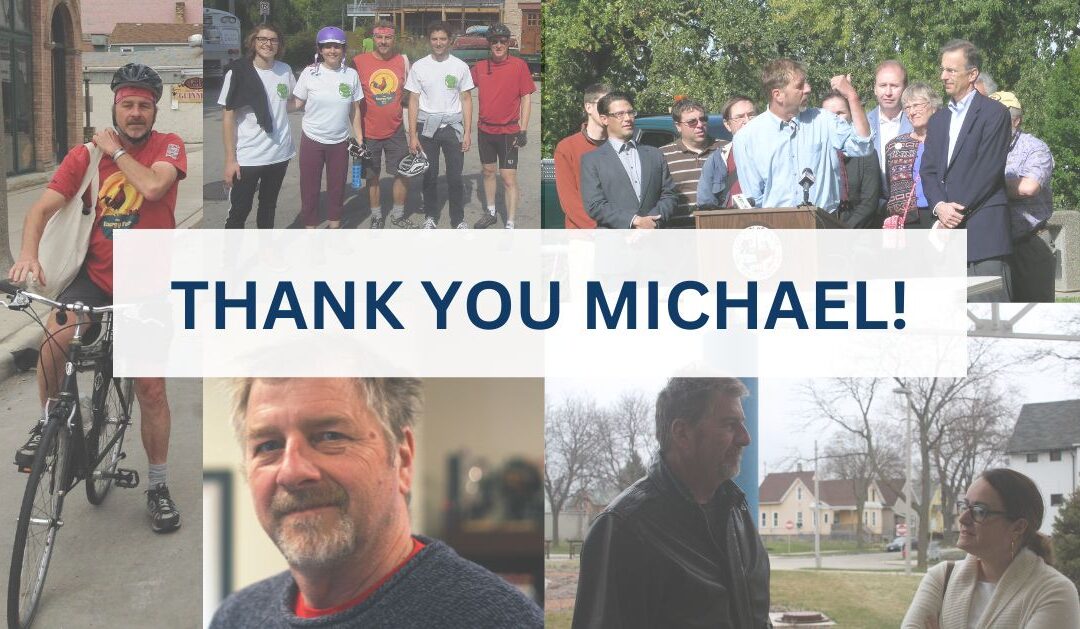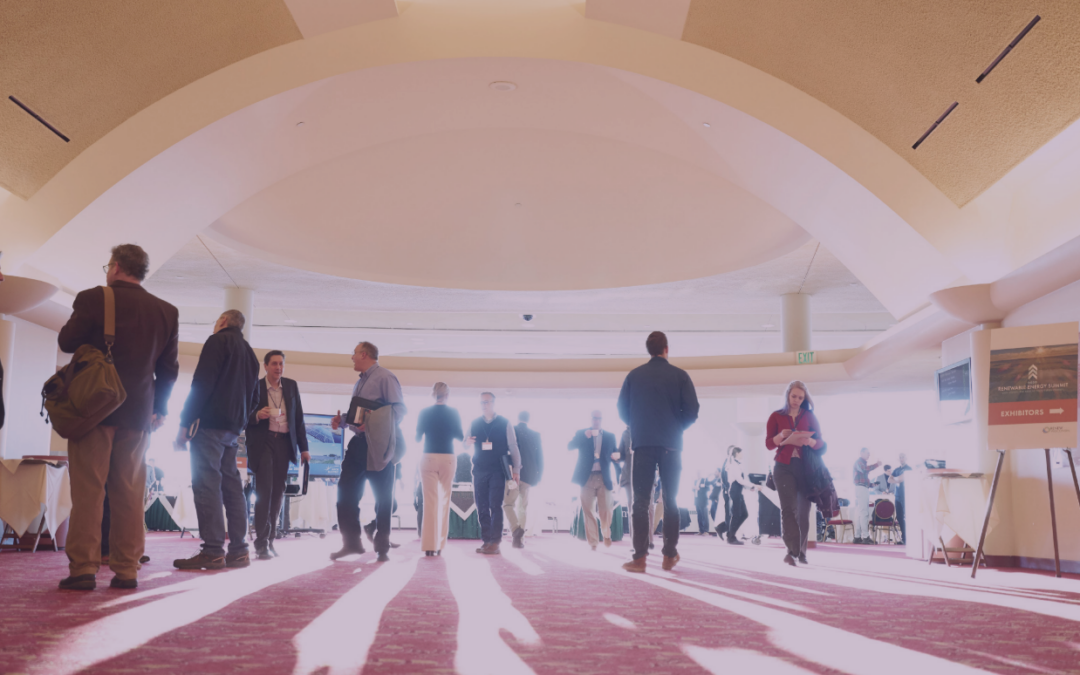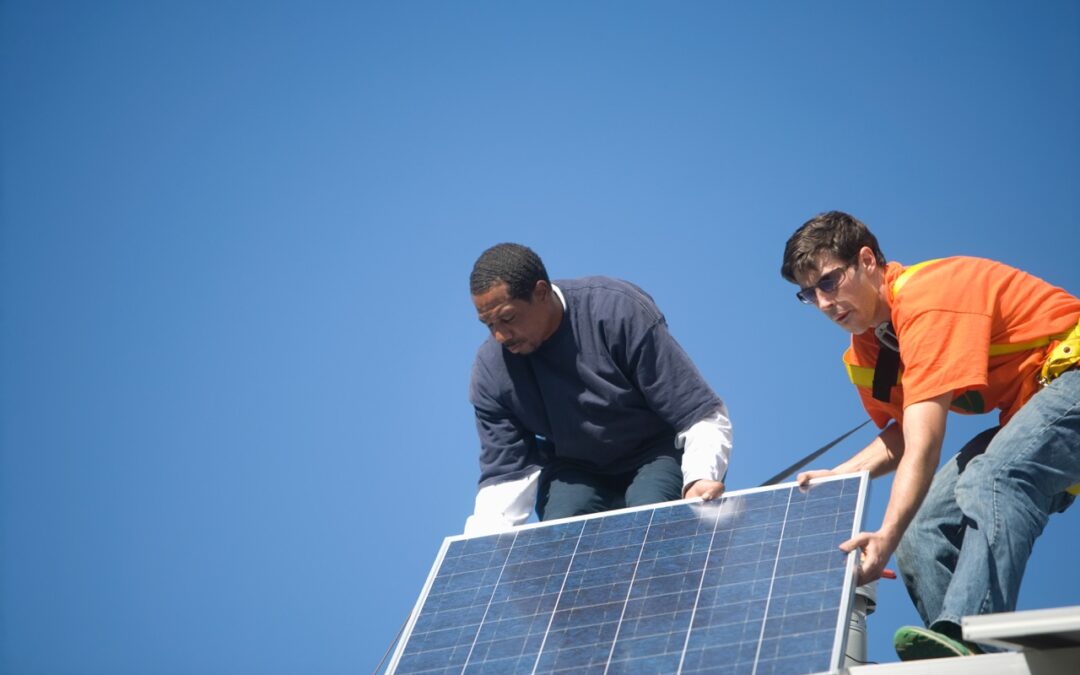
by RENEW Wisconsin | Apr 23, 2024 | Advocacy, Electrification, Press Release, Solar
The Environmental Protection Agency (EPA) has announced the recipients of the Solar for All grants, with $124 million in funding awarded to the Wisconsin Economic Development Corporation (WEDC) and Midwest Tribal Energy Resources Association (MTERA). This influx of resources will help to accelerate our state’s clean energy transition.
Solar for All will increase access to renewable energy for around 15,000 Wisconsin homes, including single-family, multi-family, or community solar projects. The grant awarded to WEDC will bring $62,450,000 to the state of Wisconsin, this historic investment will increase solar access for Wisconsinites across both rural and urban communities.
This down payment on our state’s clean economy signals a new day for renewable energy solutions for all Wisconsinites. RENEW applauds this critical step toward increased solar access and how it ensures every community can participate and benefit from clean energy. Communities across the state will experience reduced reliance on fossil fuels and expanded clean energy job creation as we build a healthier, more equitable clean energy future.
More on Solar for All:
• The Solar for All competition, which was created by the Inflation Reduction Act’s Greenhouse Gas Reduction Fund (GGRF), will expand the number of low-income and disadvantaged homes primed for residential solar investment.
• Wisconsin is one of 60 states, territories, Tribal governments, municipalities, and eligible nonprofits awarded grants to create and expand low-income solar programs that provide financing and technical assistance, such as workforce development, to enable low-income and disadvantaged households and communities to deploy and benefit from residential solar.
• The Solar for All competition will provide more than $7 billion nationwide to increase access to affordable, resilient, and clean solar energy for millions of low-income households.
RENEW congratulates Governor Tony Evers, WEDC, and MTERA on their work to ensure our state continues to bring renewable energy commitments to our state. This funding will help advance environmental justice efforts by enabling low-income households to access clean, resilient solar power, lowering energy costs, and creating good jobs in underserved areas.

by Alex Beld | Apr 22, 2024 | Press Release, RENEW Wisconsin
After a long career at RENEW Wisconsin, advocating for renewable energy across the state, Michael Vickerman has announced his retirement effective April 20, 2024. Vickerman’s professional legacy spans over 33 years and demonstrates his tireless commitment to Wisconsin’s clean energy transition.
Vickerman got his start at RENEW after responding to a classified ad for a limited-term program coordinator at the nonprofit. For eight years, he served as the sole employee of the organization. He was pivotal in shaping renewable energy policy and fostering collaboration among industry stakeholders.
“No individual has done more to advance renewable energy in the Badger state than Michael Vickerman,” said Sam Dunaiski, Executive Director of RENEW Wisconsin. “He has ushered advocates and professionals through every Wisconsin clean energy challenge and success over the past thirty years. His knowledge, patience, humor, and guidance are unmatched and will be missed at RENEW.”
During his three-decade stint with RENEW, Vickerman held several positions within the organization, serving as Executive Director, Program and Policy Director, and most recently, Clean Energy Deployment Manager.
“Though we’ve had our ups and downs, renewable energy continues to grow in ways that benefit farmers, businesses, communities, and taxpayers,” Vickerman said. “During the early years, it would not have been possible to foresee a future when every power plant in Wisconsin energized in one year would be powered by sunshine and wind energy. But that’s exactly what happened in 2023. Would that have been possible without RENEW’s advocacy over the years and decades? I doubt it.”
“As RENEW has expanded from a single employee to a 13-person staff, our ability to influence and shape state energy policy continues to grow,” Vickerman said. “It will be sad to part company with such a talented group of colleagues, but I have every confidence in their capacity to meet the challenges that lie ahead.”
Vickerman will remain connected to the nonprofit as a member of the board of directors. In his new-found free time, he plans to raise a new puppy with his wife Pamela, garden, and ride his bike around Madison while sustaining his connection to Wisconsin’s renewable energy community.

by Alex Beld | Jan 23, 2024 | Press Release, RENEW Wisconsin
January 22, 2024, Madison, Wis. — During its 13th annual Renewable Energy Summit, RENEW Wisconsin, with presenting sponsors Arch Solar and Invenergy, will honor those who made significant and lasting impacts on Wisconsin’s clean energy industry. The Summit will take place Thursday, February 1, 2024, at Monona Terrace in Madison.
RENEW’s 2024 Summit, titled “Unleashing the Power of Wisconsin’s Clean Energy Potential,” gathers industry experts, policymakers, innovators, and community leaders dedicated to accelerating the transition to clean energy sources. Featured speakers include Tonya Hicks, CEO of Power Solutions, Inc., and Robert Blake, Owner of Solar Bear and Executive Director of Native Sun Community Power Development.
The awards are grouped under three categories:
- Clean Energy Champion: Maria Drews, Co-owner – Drews Solar
- RENEW Member of the Year: Full Spectrum Solar – Madison WI
- Energy Reporting Excellence: Jana Rose Schleis, Enterprise and Investigative Reporter – The Cap Times
The ceremony will conclude with the 2023 Clean Energy Honor Roll, in which RENEW will recognize 13 clean energy projects in Wisconsin that recently commenced operation. Whether on the basis of their productivity, innovativeness, attention to detail, scale, resourcefulness, or efficacy in reducing carbon emissions, these projects showcase the skills and know-how Wisconsin stakeholders bring to the clean energy marketplace.
Clean Energy Honor Roll:
Alliant Energy Solar Portfolio, Dodge, Grant, Green, Jefferson, Rock, Sheboygan, and Waushara Counties
Eight solar PV power plants – 639 megawatts.
- Badger Hollow, Iowa County
The largest solar PV power plant in Wisconsin – 300 megawatts.
- Bayfield County, Bayfield County
Microgrid project that integrates solar PV, battery storage, and an existing backup diesel generator.
- City of Madison, Dane County
Nine (9) behind-the-meter solar PV installations – 585 kilowatts.
- College of Menominee Nation, Menominee County
Ground-mount solar PV array – 40 kilowatts.
- Holy Wisdom Monastery, Dane County
Net-zero project featuring onsite solar, with battery storage, and ground-source heat pumps.
- McFarland Public Safety Building, Dane County
Net-zero building featuring onsite solar and ground-source heat pumps.
- Red Barn Wind Energy Center, Grant County
Wind power plant – 91.6 megawatts.
- Sheboygan Senior Community, Sheboygan County
Ground-mounted solar array & battery – 198 kilowatts.
- SolarShare Wisconsin, Juneau County
Two cooperatively-owned solar arrays – 4.5 megawatts.
- UW-Health Eastpark Medical Center Garage, Dane County
Solar PV parking canopy – 1,032 kilowatts.
- UW-Parkside, Kenosha County
Ground-mounted solar PV array – 2.1 megawatts.
- Yahara Solar, Dane County
Largest solar array built for one customer – 17 megawatts.
The 13th Renewable Energy Summit will also feature an exposition hall with nearly 50 exhibitors, breakout sessions, and industry professionals discussing current and future opportunities for advancing clean energy in Wisconsin. Nearly 100 organizations have also voiced their support of renewable energy by sponsoring the summit. For more information on the 2024 Summit program agenda, speakers, sponsors, registration, or press passes, please email Alex Beld (abeld@renewwisconsin.org).

by Lauren Cohen | Nov 16, 2023 | Press Release, Solar, Solar for Good
More than $280,000 in cash awards and solar panel donations were awarded to 18 Wisconsin nonprofits as part of the 13th round of grant funding for Solar for Good. These awards will lead to the development of 1,600 kilowatts (kW) of solar electricity added to the Wisconsin electric mix and over $4.5 million in renewable energy investments.
Installing solar panels allows this diverse group of nonprofits to prioritize long-term fiscal responsibility, ensuring the sustainability of their institutions. St. Vincent de Paul will utilize their grant to install a 48.1-kW solar array on their new building, allowing them to redirect financial resources back into the core of their mission. West CAP, an organization committed to combatting poverty, will install a 29.76-kW solar array on its newest low-income housing initiative. This installation may potentially eradicate energy costs for their low-income residents.
“Through our poverty-fighting programs, we want to help prepare families for a world less dependent on fossil-fueled energy,” said Peter H. Kilde, West CAP Executive Director. “This funding will not only allow us to reduce carbon emissions and help our planet, but it will also ease the energy burden for low-income families so they can afford their housing for the long term. We appreciate the support from RENEW Wisconsin and the Couillard Foundation in helping nonprofit communities make this critical transition to solar.”
In the world of nonprofits, where financial resources are already stretched thin, the idea of adopting solar energy often feels out of reach due to the high upfront costs. Recognizing this financial obstacle, the Solar for Good program aims to alleviate a portion of that financial burden.
“While our grant does not cover the entire cost of a solar installation, nonprofits receiving our support find themselves in a stronger position to secure additional funding,” said Lauren Cohen, manager of the Solar for Good program. “A Solar for Good grant acts as a valuable leveraging point, opening doors to further support for their solar projects.”
Integrating solar power into St. Vincent de Paul’s operations is a logical step, considering their existing emphasis on sustainability. Operating seven thrift stores and a processing center, they divert thousands of pounds of goods from landfills each month, promoting a green solution for excess items and integrating solar energy to align with their sustainability initiatives.
“We’re grateful to receive a Solar for Good grant to support the cost of solar panels for our new building,” said Julie Bennett, CEO and Executive Director of St. Vincent de Paul Madison. “The Society of St. Vincent de Paul is proud to increase our sustainable efforts in Dane County. Solar panels are a natural accompaniment to the ‘reduce, reuse, recycle’ effort that is fundamental to our seven St. Vinny’s Thrift Stores.”
Since its inception in 2017, Solar for Good has awarded grants to more than 200 Wisconsin nonprofits, resulting in over $16.7 million in clean energy investments across the state. These 18 organizations join a diverse community of nonprofits utilizing solar energy. Solar for Good is thrilled to contribute to their journeys towards enhanced energy efficiency and independence.
The following organizations have been offered Fall 2023 Solar for Good grants to install new solar energy systems:
Agrace Hospice Care – senior living, Madison
Art Intersection MKE – community service, Milwaukee
Aurora Medical Center Sheboygan County – healthcare, Sheboygan
Catholic Ecology Center – education, Neosho
Hayward Sports Center and Community Park – recreation, Hayward
Immanuel Lutheran Church – religious, Viroqua
Little Turtles Playhouse – community service, Beloit
Milwaukee Institute of Art & Design – education, Milwaukee
Monona United Methodist Church – religious, Monona
Ozaukee Nonprofit Center – community service, Grafton
Pittsville Fire Company – community service, Pittsville
St. Luke’s Episcopal Church – religious, Milwaukee
St. Paul’s Lutheran Church – religious, Onalaska
Sugar Creek Lutheran Church – religious, Elkhorn
St. Vincent de Paul – community service, Madison
Stoughton United Methodist Church – religious, Stoughton
West Central Wisconsin Community Action Agency – affordable housing, Clayton
*One organization has asked to remain anonymous at this time.

by Alex Beld | Nov 10, 2023 | Advocacy, Net Metering, Policy, Press Release, Public Service Commission, Utilities
The Public Service Commission of Wisconsin (PSCW) unanimously voted to keep net metering for Wisconsin Power and Light (Alliant) customers yesterday. Last week, PSCW denied Madison Gas & Electric’s proposal to eliminate net metering. These two decisions create certainty for Wisconsin’s solar industry and customers.
Traditional net metering is currently the most important policy tool Wisconsin has to fairly compensate rooftop solar owners and incentivize future solar installations. This model supports Wisconsin’s thriving solar industry, offers good-paying jobs, and helps Wisconsin reach its decarbonization goals. When the time comes to transition away from net metering, collaboration between clean energy advocates and utilities will be essential to ensure that the transition is equitable and values each customer’s solar installation.
The revised version of the Power Partnership would have preserved key aspects of net metering while creating new benefits. The adjusted proposal offered a durable framework that recognized the value of each customer’s solar installation to Alliant’s infrastructure. Power Partnership limited the risk to installers, ensured a steady revenue stream to solar customers, and provided a solid growth path for solar and storage.
We stand behind our work with Alliant to create a viable solution for the solar industry. We believe there is a path forward for a collaborative effort to ensure the benefits of clean energy are shared throughout the state. And we are grateful for the successful advocacy work of other intervenors and clean energy advocates in defending net metering. We look forward to continuing our collective work to ensure the benefits of clean energy are shared throughout the state.

by Alex Beld | Nov 3, 2023 | Advocacy, Net Metering, Policy, Press Release, Public Service Commission, Utilities
The Public Service Commission of Wisconsin (PSCW) delivered a unanimous decision on Friday to keep net metering in the Madison Gas & Electric (MGE) territory. This action is a win, not just for MGE customers but for all of Wisconsin.
“It almost felt as though it was a half-hearted proposal, and so I didn’t feel like there was enough information to support authorizing it [MGE’s proposed net metering change],” said PSCW Chairperson Rebecca Valq. “… for Wisconsin to have a consistent approach to net metering, I would not approve this proposal.”
There was overwhelming support to keep net metering in MGE’s service territory. There were 500 members of the public and 14 intervenors, including RENEW, who opposed MGE’s proposed net metering changes. This collective effort played a vital role in ensuring rooftop solar will remain financially viable for MGE solar customers.
This decision from the Public Service Commission of Wisconsin represents a major win for rooftop solar and the solar industry in Wisconsin. Net metering is fundamental in ensuring that rooftop solar owners are properly incentivized and compensated for their energy generation. We look forward to working with other utilities to ensure residential rooftop solar and large-scale renewable projects remain viable tools for meeting Wisconsin’s decarbonization goals.
Net metering has a direct impact on the local economy. The installation, maintenance, and servicing of rooftop solar systems creates employment opportunities, providing long-term benefits for Wisconsin communities and businesses. RENEW is celebrating the decision made by the PSCW today to ensure equitable access to solar for all Wisconsin families and create certainty for local solar installers.
The collective efforts of our members, partners, and the general public were crucial in the effort to protect net metering. Thank you to everyone who made their voices heard in the MGE rate case. We look forward to hearing from the PSCW again later this November when they deliver their decision for the Alliant Energy rate case.





